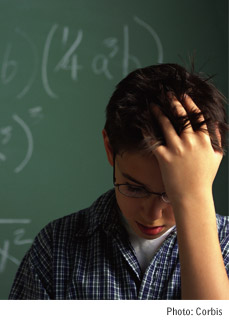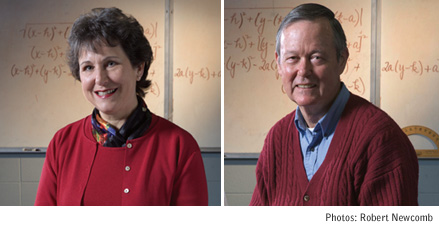


Building a Better Math Teacher
by Frank Stephenson
Intro
| Goal One: Teacher Quality/ Look Beyond the Ed Schools
| Toward a Deeper Understanding/ Show Us the Money

 Policymakers say that American students’ poor grasp of mathematics has serious implications for the nation’s capacity in science and technology and thus for its global competitiveness.
Policymakers say that American students’ poor grasp of mathematics has serious implications for the nation’s capacity in science and technology and thus for its global competitiveness.
Intro
UGA leads a joint effort to produce more and better-qualified teachers armed with a deeper understanding of mathematics.
Why can’t American School Kids Do Math?
A 2004 international study of math performance among school children in 11 industrialized countries showed that U.S. students not only are still lagging behind their foreign counterparts, but also may be losing ground.
The study, the third of its kind done since 1995, showed that out of three grade levels — the 4th, 8th and 12th grades — American students ranked no higher than 8th place among their peers in countries that included Australia, Hungary, Japan, Norway and the Russian Federation.
The new findings raise again the plight of U.S. math educators and school districts that have borne increasing criticism in recent years for the dismal math scores posted by their students. In their defense, school officials typically cite a lack of money and other resources necessary to attract and hold onto good math teachers.
 “You’ve got a class full of kids who need to be taught algebra and you don’t have any more algebra teachers, so you hire somebody — anybody — to teach those kids algebra, and that person may not know a thing about algebra. It’s a scandal.” — Jeremy Kilpatrick (right) (Pat Wilson on left)
“You’ve got a class full of kids who need to be taught algebra and you don’t have any more algebra teachers, so you hire somebody — anybody — to teach those kids algebra, and that person may not know a thing about algebra. It’s a scandal.” — Jeremy Kilpatrick (right) (Pat Wilson on left)
But increasingly, fingers are pointing to a long-running and highly divisive feud over the best way to teach math. These so-called “math wars” — essentially a battle between those who value teaching the process of math over content — is a decades-long dispute that critics say is wrecking math education and producing bad teachers.
Noted math educator William H. Schmidt of Michigan State University is typical of critics who blame the nation’s critical shortage in qualified math teachers on a philosophical-turned-political debate that no other country in the world seems the least bit troubled by. Schmidt argues that the debate has created a watered-down curriculum in math education classes throughout colleges of education, leading to graduates who often have weak computational skills and only a shallow understanding of mathematics concepts.
“We must address this issue of teacher quality, and one important way is to begin by including mathematical knowledge as a key component in the definition of teacher quality,” Schmidt wrote. To produce more high-quality teachers, math educators must stop pushing “reform that is not based on scientific evidence but rather on opinion and someone’s ideology,” he said.
Policymakers say that U.S. students’ poor grasp of mathematics has serious implications for the nation’s capacity in science and technology and thus for its global competitiveness.
In a report to a Senate Education Committee in April 2005, Brian K. Fitzgerald, executive director of the Business-Higher Education Forum (a Washington, D.C., lobbyist group that represents U.S. corporations and universities), described a number of “disturbing trends” that his group’s research had identified. While demands for American workers with mathematics and science skills are at an all-time high, the performance levels of American students on comparative international math and science tests may charitably be described as “disappointing,” Fitzgerald said, as are the numbers of science and engineering degrees awarded to Americans. Fundamental to these problems, he noted, is that the nation faces “a critical shortage of qualified mathematics and science teachers.”
This aspect of the forum’s report came as no surprise to experienced K-12 educators, who’ve bemoaned the teacher-shortage crisis for decades. A 1981 study showed that 43 of 45 states surveyed had fewer math teachers than they needed. Two years later, A Nation at Risk, a hard-hitting report commissioned by the U.S. Department of Education, cited critical shortages in qualified math and science teachers nationwide. The report criticized widespread teacher-training curricula that the authors described as being “weighted heavily with courses in ‘educational methods’ at the expense of courses in subjects to be taught.”
Intro
| Goal One: Teacher Quality/ Look Beyond the Ed Schools
| Toward a Deeper Understanding/ Show Us the Money
For comments or for information please e-mail: rcomm@uga.edu
To contact the webmaster please email: ovprweb@uga.edu
![]()